HR software and services are a vital part of any business. They enable employees to do their work efficiently while giving managers the tools to lead effectively. However, finding the right HR system for your organization is often a daunting task.
With so many options available, you’ll want to make sure you find the one that best fits your needs, from day-to-day operations to legal compliance demands. While there is no one-size-fits-all HR software out there, you want a system that provides the features you need without being overly complex or difficult to use.
In this article, we’ll walk you through the process of finding the best HR software and services for your company. We’ll discuss choosing the right system, what to look for when comparing the software, and analyzing some of the best HR software and services on the market.
HR Software vs. HR Services
HR software is a term that describes any system or application designed to manage human resources functions. These include applicant tracking, benefits administration, performance management systems, time and attendance management, payroll processing, and much more.
The right HR software for your company will depend on your organization’s size and industry, its needs, and the technology available to you.
HR Services complement your HR software by offering various internal and external services. These include employee training, recruitment, performance reviews, onboarding new employees, benefits counseling, exit interviews, and more. As with many business systems & services, the best approach is to combine HR software and HR services.
Types of HR Software
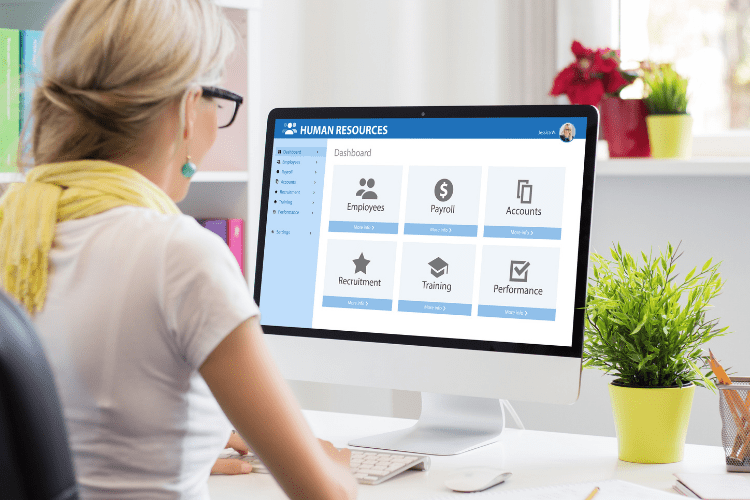
There are different types of software to consider. Your business may need just one system or many. Here are the categories of software available today:
HRMS – Human Resources Management System
The HRMS is the most traditional type of software used by large corporations to manage the company’s human resources. This system handles all aspects of the employee life cycle – finding, hiring, managing, and terminating employees.
HCM – Human Capital Management
HCM is an evolution of HRMS. It came about as companies recognized the need to do more than manage people. They needed systems to align them with business goals. There are several types of HCM systems available today, each designed to meet an organization’s unique set of needs.
HRIS – Human Resource Information Systems
An HRIS system specializes in one area of employee management-recruiting, training, performance management, and benefits administration. Some organizations prefer this approach because it gives them more control over what information they collect and how to use it.
Other types of HR Software feature more specialized functionality. Examples include:
- Payroll Systems
- Time-Tracking software
- Access Control
- Inventory Tracking Systems
- Resume Management Systems
- Business Intelligence Software/Reporting Tools
- Employee management system
- Applicant tracking system
- Payroll processing software
- Benefits administration
Hybrid vs. All-in-One Solutions
Hybrid solutions offer a customized approach to your HR needs. They deliver flexible modules, which you can mix and match depending on your business’s needs. You’re not locked into one set way of doing things; you can continually expand or reduce the number of features as needed.
All-in-one platforms tend to offer more features right out of the box, but you might end up paying for more than what you need. Because all-in-one solutions don’t have customization options, you have to work around any limitations.
If you’re not sure where to begin your search, spend some time learning about each company’s strengths and features. It helps to find a vendor with a package that includes what you need cost-effectively.
When selecting a hybrid HR software and an all-in-one platform, consider your company’s size and growth plans. If you don’t need a lot of features, then a hybrid solution could be the best option for your business.
How to Select the Right HR Software for Your Business

It’s easier than ever to discover information about various HR software choices in today’s world of internet research, unbiased reviews, and peer referrals. But there are a few things you should think about before reading the rave reviews or cutting your budget.
Evaluate the Goals and Needs of Your Organization
The first step to selecting the best HR software is to evaluate your business and what challenges you’re facing. Knowing where you’re trying to go makes it easier to sort through all of the noise and find a system that fits.
What is your business looking for in an HR system, and why? Are you trying to make the recruiting process more efficient, improve internal communication, or prepare for an audit? An inquest into your current systems and practices can help point you in the right direction.
Before selecting, brainstorm with all the relevant stakeholders about your business’ needs and find out what is most important to each group. A rule of thumb is to make sure everyone in your company is on board with the changes you’re planning to implement.
Available Resources for Implementation and Management
Every HR system can benefit from good management. The important thing is to find the right mix of software and services for your business, given its structure, culture, industry, geographical location, budget, and human resources available.
Your system choice should complement your organization’s strategy and be an economical solution that provides maximum return on investment.
To get started, consider whether your company needs to hire an IT consultant or not. While outsourcing does mean higher costs, it can help overcome obstacles and challenges associated with implementing your chosen HR software.
Notably, compensation and benefits often require nuanced expertise to assess an employee’s worth accurately. It may be wise to hire a specialist in this area when creating or revising your HR system, especially when it comes time to integrate payroll software into the mix.
Industry and the Legal Regulatory Factors
Every HR system will have features that help businesses run smoothly. But certain types of software are better for specific business needs or industry requirements. For example, if your organization deals with sensitive data like healthcare providers, you will be subject to more stringent federal and state laws.
When selecting HR software, you may want to choose a system that offers practical solutions for compliance with industry regulations and adheres to the best practices of your sector or profession. For example, some companies within the technology industry may choose a cloud-based solution, whereas healthcare providers might choose a more robust, on-site server.
Flexibility with Pricing and Subscription Services
Pricing and subscription models can vary, depending on your industry and software provider. For example, you can outright purchase some HR systems, but others offer a subscription model. Some companies offer both options, including on-site and online versions of the same software. You can also choose to upgrade or downgrade your package based on changing needs.
Subscription packages typically have a fixed term of one month to one year, whereas perpetual licenses are purchased outright and do not have an expiration date. From a practical standpoint, subscription models are better for cash flow, whereas perpetual licenses are better for testing how the software will operate in your business environment.
While the cost of these tools may seem high initially, consider that most reputable providers include technical support and access to new features and upgrades with their pricing model. An excellent way to get ahead is to look for industry-specific HR software with the capabilities you need to run your business more efficiently.
Scalability
Some HR software packages may suit small businesses, while others are scalable for larger companies, giving smaller players room to grow as their needs change. Depending on how many users will utilize the system or what features you plan to access regularly, some companies may need to upgrade their software to accommodate growth.
At the same time, it’s important not to purchase so much software that you pay for features and services your business does not yet need. Remember, an existing system may incorporate some of the functions and capabilities you want to take a holistic approach when looking at what HR solutions will fit your needs.
Industry Trends and Future Business Needs
When trying out new software, it’s good to think about potential business needs and plan for growth before selecting a system. Industry trends that may influence your decision include mergers and acquisitions, the implementation of new laws and legislation, and technological advances like cloud computing.
When your company grows or changes over time, it’s essential to take advantage of any built-in scaling features or affordable upgrade packages that can help accommodate future needs. A sound HR system should be flexible enough to adapt, with users who can access the software remotely or on-site.
Key Features and Functionalities of the Best HR Software

When selecting HR software, it’s best to look for an all-inclusive system with all the functions and features you need. The best HR software will offer many benefits, including easy access to company data and records, flexible service plans, comprehensive support services, flexible design capabilities for users’ individualized needs.
Consider the following features and functionalities when looking for HR software that meets your future business needs.
Payroll
The best HR software offers a complete, all-inclusive approach to managing employees’ pay. It allows for easy access to payroll information, offers comprehensive reporting on an ongoing basis, and allows for customization if regulations change in the future.
Timekeeping
Employees who clock in and out of their shifts will need HR software that provides easy tracking, recording, and reporting. The best programs allow for compensation tracking by task or project and can handle managerial approvals.
It’s also crucial for employers to ensure they can configure their software to complement any existing timekeeping or attendance systems, including biometric technologies currently in use.
Recruiting
When you’re looking for the right employees, it’s essential to track all of your applicants and their records at a moment’s notice. One that features applicant tracking is best for efficiency, giving you access to all of your hiring needs—including tracking resumes, screening applicants based on skill sets and certifications, posting jobs to sites like LinkedIn, and storing company data.
Performance Management
The best software offers a holistic approach to performance management, allowing for consistent reviews built on feedback from supervisors and direct reports alike. It’s also vital that your HR system offer standardized evaluations with continuous development planning.
Employee Engagement
The best HR software allows employees to provide feedback on their recent work experiences with tools like company surveys or social networking groups. Your system should identify trends and track metrics over time, which can help you create customized action plans that map out future initiatives.
Training and Onboarding
When new employees join your company, you’ll want to have easy access to HR software that tracks their progress from hiring through onboarding and well beyond.
Tasks such as tracking the completion of courses or projects, establishing a central file system for all training materials, and getting alerts when people finish their courses can help you promote individualized development.
Employee Self-service
The best HR software allows employees to manage their data and records, update contact information, request time off, view pay stubs, and get notifications of important deadlines or company meetings. In addition, your system should be secure and confidential for your employees’ sensitive information.
Benefits Administration
There are multiple aspects to benefit administration, including tracking enrollment, filing claims, and managing health care programs. Your HR software should offer an integrated approach for employers to manage all of their current or potential employee benefits on one platform. The system should give a step-by-step guide from enrollment to submission.
Unlimited Users
As your business grows, so will the number of employees who need access to the HR system. Make sure you choose a software platform that can scale with your company by offering unlimited user support for future hires or possible expansions.
Price as a Factor for HR Software and Services

Price vs. value is a decision-making skill that weighs the price of a purchase against its usefulness. Determining the best HR software for your company is no different. Evaluate each vendor’s proposition based on their value, not necessarily their prices.
Your company’s needs are unique, and price as a factor for HR software and services won’t be the same for every business. While vendor pricing varies based on how many users you need, what features you can use, and your company size, it helps to know that the best HR software is not the most expensive.
It’s more likely that the pricier packages will be overkill for your company and its needs. But that doesn’t mean that the more affordable vendors are substandard.
Consider all of your options, then ask for customized demos to compare their functionality. Make sure you include your needs, not just what you want it to do. When reviewing your options, ensure they fall in line with your budget.
Other Considerations
Features and functionality can set various suites apart, but not all of the most critical features are flashy and front-facing. Take a look at the following additional factors before you make your decision:
Security
System security should be a top priority for any business, large or small. Consider how your HR system ensures data confidentiality and requires authentication to access sensitive information. Make sure you encrypt and secure your company’s sensitive data on both the backend and from your employees.
Interoperability
If you choose a platform that can integrate your existing systems, you can streamline your HR activities and eliminate redundant tasks. For example, if you use another HR system to manage payroll, your new software should integrate with it for an easy transition. You can maintain processes from the same system while adding new features to your growing business.
SEO-Friendliness
If your company is slow to adapt its website for mobile users, your HR system should also be up-to-date. Look for vendor packages that offer SEO-friendly URLs and make it easy for customers to interact with your business site.
Intuitive Interface
Your HR software should give you a streamlined experience that allows you to get your work done without learning a different interface each time. Look for user-friendly features and customizable settings for your employees’ convenience.
Training and Support
Like every software system, your HR solution will have its kinks. But how your provider supports your employees’ first steps determines their experience and overall satisfaction. Training and support should be readily available if you need someone on hand for a quick question or extensive troubleshooting.
The Best HR Software for Your Business
The right HR software empowers your employees and allows them to focus on the one thing they should: their work. Whether you need a fully managed system but want flexibility for future functions or vice-versa, you can find the best HR software for your business.
Below is an analysis of the top HR software vendors you should consider:
Gusto: Best All in One
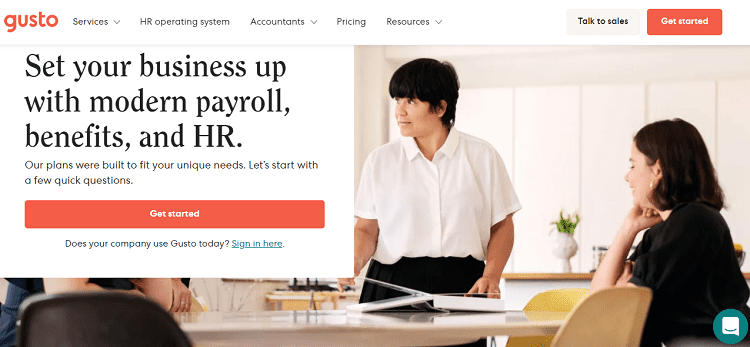
Gusto is an all-in-one cloud-based HR software ideal for small businesses and companies with few employees. The software appeals to experienced and inexperienced HR managers due to its ease of use and intuitive interface. Its excellent customer support and the low entry price point to the system make it an excellent fit for small businesses.
Features
- Full-service payroll
- Employee benefits
- Time and attendance
- Hiring and onboarding
- Talent management
- Insights and reporting
Pricing Plans
- Complete: $39/mo base price + $12/mo per person
- Concierge: $149/mo base rice + $12/per person
Pros
- Easy HR software for small businesses
- Great customer support
- Flexible package options
- Excellent employee packages
- Contractor only version
Cons
- No tracking features in the core plan
Deel: Best for Payroll Services
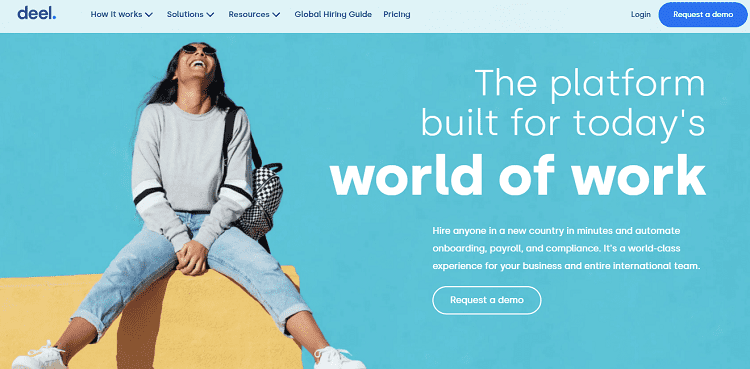
Deel is an HR software for payroll that offers valuable features to prospective employers. The platform features a full-service payroll system that allows you to pay your employees on time. With Deel, you can integrate with other systems such as QuickBooks, Xero, Okta, and more.
The user-friendly software is easy to learn and use; you can also make it yours by customizing your interface and settings. The system also provides HR professionals with the necessary tools for attracting qualified candidates, including comprehensive reporting and analytics.
You can manage tax compliance and benefits in over 150 countries to ensure you stay compliant with financial regulations.
Features
- Compliance management
- Data protection
- Payroll
- Benefits management
- Remote support
- Contractor management
Pricing
- Hire contractors: $49/contractor/month
- Hire employees: Free/employee/month
Pros
- Easy setup
- Cloud-based
- International payroll
- Great reporting
Cons
- Pricey in the long run
Namely: Best for Self Service
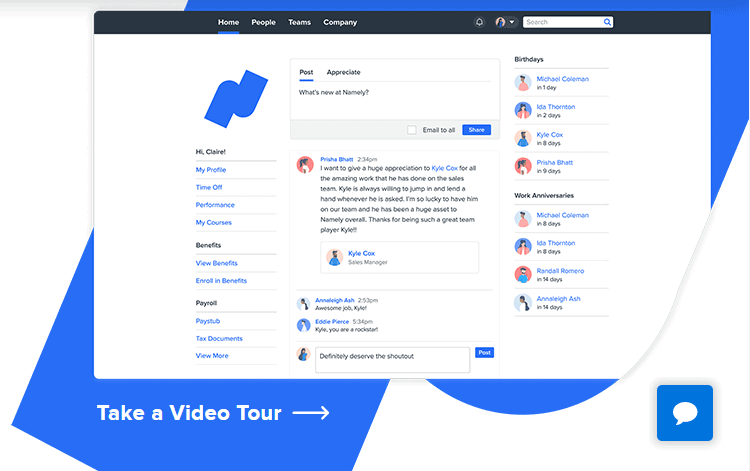
Namely is the best solution for businesses that prioritize self-service. The software is simple, functional, and easy to use. In addition to HR services, Namely also handles payroll management and includes tools to manage benefits, perks, and more.
It offers everything you need for HR management in one place. The Namely software falls under the HRIS (Human Resources Information System) definition. Its centralized HRIS software allows you to manage your employees’ information and access important reporting tools.
Features
- Performance and goal tracking
- Task lists
- Compliance database
- E-signature
- Onboarding
- Custom fields
Pricing
- $25 per month per employee
Pros
- Ease of use
- Customizable reports
- Cloud-based
- Easy employee management
Cons
- Some users find the pricing model unfair compared to other platforms
Workday: Best HCM Software for Large Businesses
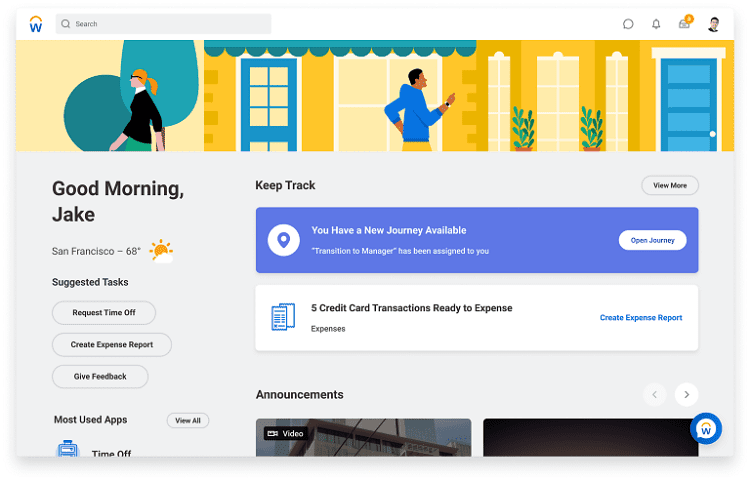
Workday is an HR software for companies that demand the best. The system has everything you need to manage employees and their paychecks, and the pricing plan is affordable even for large businesses.
Although Workday provides a lot of features, it’s easy to learn and use. Its focus on the finance aspect of HR management makes it a great fit for large businesses. It also offers several tools to manage employee benefits, paperwork, compliance, and more.
Workday is a leader in the 2021 Gartner magic quadrant for cloud core financial management suites for midsize, large, and global enterprises.
Features
- Time tracking
- Benefits administration
- Career and development planning
- Organization management
- Performance management
- Goal management
- Financial management
- Human resources management
Pricing
- Not provided by the vendor
Pros
- Flexible and scalable
- Great cloud platform
- Big data initiative
- Ease of use
Cons
- Complicated and clunky interface
- Limited reporting capabilities
TestGorilla: Best for Onboarding and Training
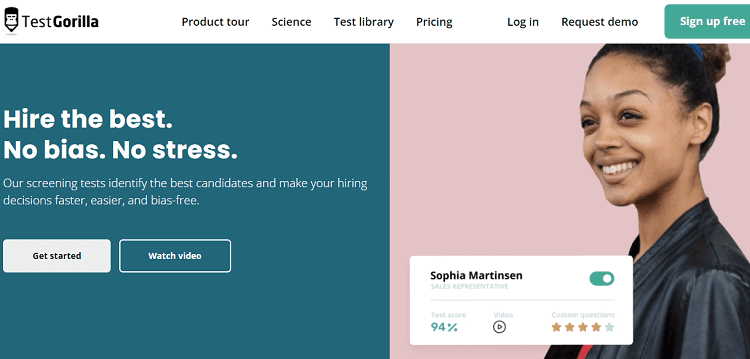
If you need flexible and affordable HR software, TestGorilla is an excellent solution. The system offers a comprehensive platform for companies in many industries, including technology and e-commerce. It also offers training and onboarding resources that can help companies attract high-quality workers.
TestGorilla facilitates the creation of online tests, quizzes, or exams. It also offers tools for tracking and reviewing candidate results. With the available training management system, you can build custom training programs for your employees.
The screening tests measure skills, abilities, and other qualities that match the needs of your company. The platform also lets you add pre and post-assessment tools to your tests.
Features
- Ability testing
- Anti-fraud functionality
- Automated hiring process
- Onboarding
- Job applications
- Reporting and analytics
Pricing Plans
- Pay as you go: $25 per
- Scale: $300 per month
- Business: 3000 per month
Pros
- Affordable for small businesses
- Accessible interface
- Easy to use
- Anti-cheating functionality
- Large library of questions
- Easy to use
Cons
- Not suitable for very large businesses
Other Top HR Software and Services to Consider
The following are other popular HR software/services that are worth considering.
Oracle HCM solution (TrustRadius Rating: 8.5/10)
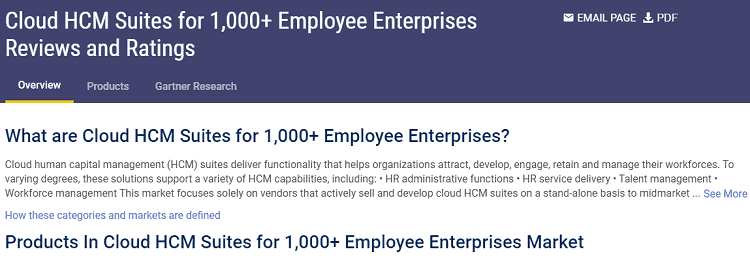
A leader in the 2021 Gartner Magic Quadrant for Cloud HCM suites for 1000+ Employee enterprises. Oracle is a common name in the HR community. The Oracle HCM solution is one of the most popular software in the market today. It’s also known for its great customer service and available support.
BambooHR (g2 Rating: 4.4/5.0)

BambooHR offers an extensive range of features for companies of many sizes. A software with a soft touch on employee management and HR-related aspects, BambooHR has undergone a series of enhancements and innovations to cater to the needs of SMBs.
ADP Workforce Now (Trustradius Rating: 8.0/10)
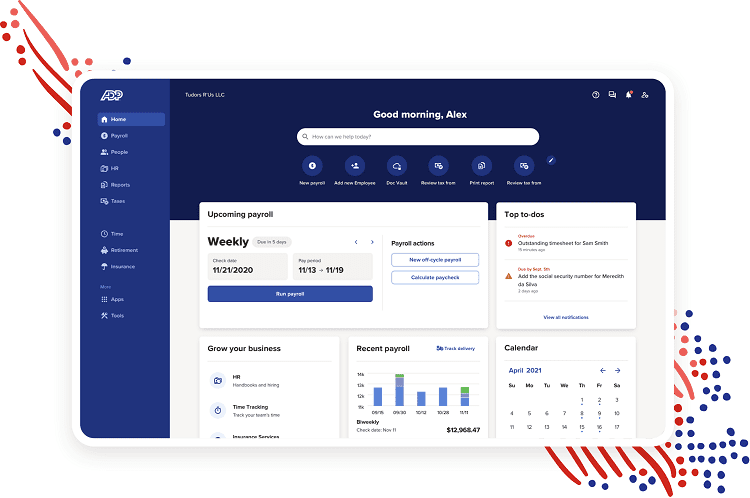
ADP is a familiar name in the HR industry, and its ADP Workforce Now is an attractive option for midsize companies. You can create employee profiles, process payroll, keep records of employment history, and more.
SAP SuccessFactors (Gartner Rating: 4.3/5.0)
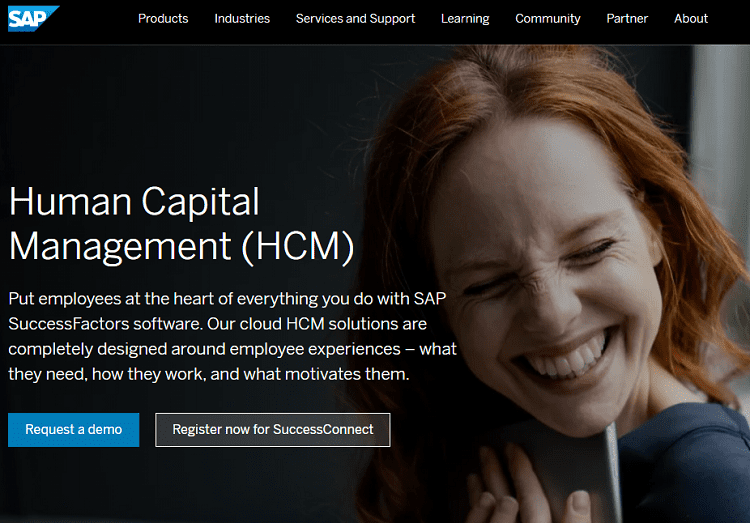
SAP SuccessFactors is one of the most comprehensive HR software solutions in the market. The service caters to companies of all sizes, and it’s known for its robust features. Some features integrate with SAP’s other offerings like SAP Ariba for procurement, SAP Fieldglass for contingent workforce management, and SAP Hybris Cloud for Sales.
Ceridian Dayforce (g2 Rating: 4.2/5.0)
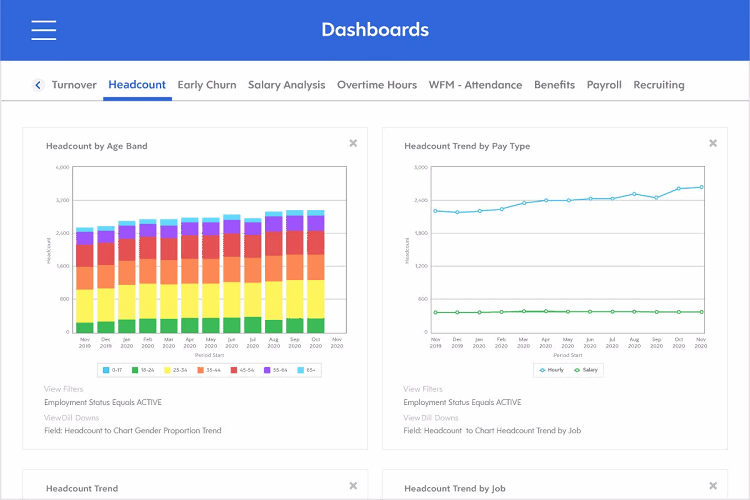
Ceridian Dayforce is one of the fastest-growing HR solutions for small and midsize businesses. The platform uses modern technology to solve any organization’s most pressing HR needs, from payroll to time management. A solution to HCM, pensions, benefits, and payroll processing.
Trends in HR Software and Services You Should Watch
To make the right HR decisions for your company, you’ll need to do a lot of research and comparison shopping. Here are some trends that will affect the HR software market and the way you and your employees use HR services:
Cloud-Based HR Software
The cloud is playing a major role in the development of new HR software and services. Companies are increasingly designing their HR systems to run via cloud technology, making it easier for your employees to access the system from any device. A web-based system is also more versatile than on-premise software, as businesses can modify it and deploy it anywhere, anytime.
Machine Learning and Artificial Intelligence
The latest HR technology is turning to machine learning and artificial intelligence to make hiring decisions, make employee assessment more accurate, and create a comprehensive picture of your workforce.
Machine learning uses algorithms to improve results and automate processes. For example, an HR software platform might use machine learning to learn your organization’s culture and processes and then make hiring decisions based on this knowledge.
Artificial intelligence takes the idea of machine learning one step further by creating agents that act independently to make decisions based on collected data. 55% of respondents in a recent study by Statista believe that AI in human resources helps nurture talent.
Virtual Reality
In terms of services, virtual reality (VR) is a growing trend in the industry. This technology can help companies attract new talent through immersive experiences that provide a better sense of the work environment.
A study by PWC indicates that employees trained using VR were four times faster in grasping required skills than those trained in classrooms. This technology lets employees get hands-on experience in a safe environment.
Integrating Big Data with HR Software
HR data is valuable. The more information you have about your workforce, the better decisions you can make. New software lets you analyze data from various sources to build a comprehensive picture of your workforce and business needs.
Machine learning algorithms allow HR management systems to collect data from all available sources, review this information in real-time, and provide ongoing analysis. This approach can help you uncover hidden trends, such as the best days to perform certain HR actions or the ideal way to communicate new policies.
The Rise of the Chatbot
Chatbots are a major trend in business automation. These chatbots can automate basic HR processes, such as payroll, human resources, benefits, and legal processes using artificial intelligence. Businesses can configure their chatbot to interact with their employees through various messaging apps.
Employee Experience
Employee experience is all about reducing the distance between employees and their employers, helping them solve problems faster, and providing transparency about company decisions.
Employee experience starts with onboarding, where HR software can provide automated processes to make the process easier and more efficient. In the long term, HR systems can offer a wealth of information about employees’ needs and identify gaps in communication to improve employee engagement.
Workforce Analytics
Workforce analytics use data analysis to develop an in-depth understanding of your workforce. This approach allows HR managers to make better decisions and evaluate the impact of their actions in real-time.
HR analytics can help you identify problems in your hiring process and keep track of employee retention rates. You can use a workforce analytics platform to analyze your business’s various factors and make informed decisions.
How to Find the Best HR Software and Services (FAQs)
Answer: To choose the best HR software, you need to understand your company’s needs. Different HR management systems offer different features and functionality. The best way to identify which platform is right for you is by considering your current operations and processes and understanding how you want them to improve in the future.
Answer: Workday stands out as one of the best HR software platforms. This solution offers a robust HR management system that you can customize to suit your business needs. Other software includes; Zenefits, BambooHR, and Applitrack.
Answer: The ideal HR information system offers a comprehensive, real-time view of your company’s workforce. Look for a system with configurable workflows that you can manage remotely using smart devices. It should be easy to customize, and the vendor should provide a range of training options.
A good HR system must be easy to use and configure. Look for software that is packed with features but simple to set up and implement. It should have a powerful reporting tool that lets you review employee data from one central location.
Conclusion
HR software and services can help your business to improve and scale HR operations. The best systems take a strategic, automated approach to HR management that saves time and lets you focus on improving performance. Finding the right solution involves understanding your business needs and investigating the various solutions on the market.
Note that a good HRIS system should make your life easier. It should be easy to implement, configure, and use while providing all the functionality you need to manage employees effectively. As a business owner, you should watch out for HR automation trends, such as chatbots and workforce analytics, to stay top of the game.

